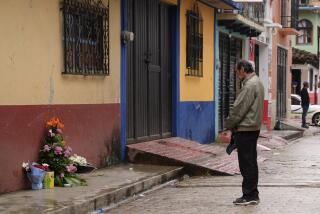Prelate Mistakenly Slain, Mexican Panel Says
MEXICO CITY — Seven years, two months and three days after hired gunmen pumped 14 bullets into Guadalajara’s top Roman Catholic prelate, a joint civilian-government inquiry commission Thursday backed federal prosecutors in concluding that Cardinal Juan Jesus Posadas Ocampo’s murder was a case of mistaken identity during a shootout between rival drug mafias.
But the cardinal’s successor and the opposition state government of Jalisco, of which Guadalajara is the capital, immediately rejected the findings.
They continued to insist that Posadas Ocampo, who was clad in his black church vestments and wearing a cross when he was sprayed with gunfire at close range outside the Guadalajara airport, was executed in “a premeditated homicide” under the cover of “a prepared scenario” in a still-unsolved conspiracy.
Among the theories is that Posadas Ocampo was deliberately targeted by the drug cartels. He was an outspoken critic of the cartels, which have made billions of dollars using Mexico as a key smuggling route for South American cocaine sold in the United States.
The sharply contrasting versions of the shootout came during a bitter, four-hour news conference called here to present the results of a two-year, joint investigation by federal investigators and church leaders into the first of a series of assassinations that rocked Mexico during the past decade.
For most Mexicans, Thursday’s findings are unlikely to close the book on a mystery that continues to haunt their nation.
But the differences in the two detailed descriptions of the case presented at the federal attorney general’s office reflect a broader and deeper mistrust between the ruling Institutional Revolutionary Party, or PRI, and the opposition National Action Party, or PAN, which won the July 2 presidential election.
Posadas Ocampo’s killing is just one of several high-profile, unresolved murders that will confront the PAN’s Vicente Fox on Dec. 1, when he becomes Mexico’s first opposition president in 71 years.
Fox has vowed to appoint new, independent commissions to reinvestigate the cardinal’s killing, along with the subsequent 1994 assassinations of the PRI’s presidential candidate, Luis Donaldo Colosio, and its second-ranking official, Francisco Ruiz Massieu.
Many Mexicans have long suspected that federal prosecutors are covering up high-ranking ruling party involvement in all three killings. And most expect Fox to make good on his promise to question the slayings anew, although the president-elect and his aides have said they will not conduct “witch hunts” after they take power.
Against that backdrop, there were few surprises in the widely divergent theories concerning the cardinal’s killing presented here, first by the PRI government’s attorney general and then by the PAN’s leadership in Jalisco. The PAN’s version was strongly endorsed by Posadas Ocampo’s successor, Cardinal Juan Sandoval Iniguez.
“After seven years, I am only partially satisfied,” Sandoval, who was not among the 10 commission members, declared at the end of the marathon news conference. “For the church of Jalisco, the case is not closed. What we need to do is get the [masterminds] of the assassination.”
Two Roman Catholic bishops who sat on the commission, however, disagreed. They took turns reading a statement endorsing the federal government’s mistaken-identity theory, which the attorney general’s office had laid out in a minutely detailed, two-hour case for the prosecution.
Flanked by an 8-by-5-foot, three-dimensional re-creation of the crime scene, complete with toy cars, gunmen and rifles, the government’s rendition varied little from a 121-page report released in August 1995 by a special prosecutor appointed by Mexican President Ernesto Zedillo to conduct “a meticulous and exhaustive investigation” of the crime.
Their shared conclusion, based on 139 sworn statements, 15 lie-detector tests and a battery of forensic, ballistic and medical reports: Posadas Ocampo’s killers were two men among a group of assassins hired by the Tijuana-based Arellano Felix drug cartel to kill Joaquin “Chapo” Guzman, who was entering the airport the moment a shootout began between the two gangs.
The motive for the planned execution of Guzman, prosecutors and the commission said, was retaliation for his attacks on Arellano Felix gang members in a Puerto Vallarta discotheque six months before. The gangs were engaged in a bloody fight for control of cocaine routes into the U.S.
The commission also found that the men who killed the cardinal opened fire from several yards behind his car, which was the same model as one owned by Guzman, and they could not see the face of the victim nor his cross.
And the panel asserted that no one other than Posadas Ocampo and the representative of the papal nuncio he had come to meet knew that the cardinal would be at the airport that day. Guzman--who was not wounded in the shootout--and more than a dozen others at the scene have been convicted of various crimes and remain in prison. Six members of the gangs were killed in the hail of gunfire.
But the attorney general’s office focused most of its arguments Thursday on a preemptive effort to discredit conspiracy theories and potential witnesses from as far away as San Diego and Chicago.
Disputing the findings, Jalisco officials asserted that federal prosecutors had “planted” those witnesses and never seriously pursued other leads.
“The investigation was hurried, manipulated and oriented to discredit the conspiracy theory,” declared Fernando Guzman, the Jalisco state secretary, who is not related to the drug lord. He suggested that a third party had arranged for the two rival gangs to stage the shootout that day as a smoke screen for the killing.
Guzman conceded, though, that he had no suspects.
When his aides closed their case, Jalisco’s PAN governor, Alberto Cardenas Jimenez, summed up the mood of the day: “For the moment, all the proceedings are finished. It was not possible to reach a consensus on the assassination of Cardinal Juan Jesus Posadas Ocampo.”
More to Read
Sign up for Essential California
The most important California stories and recommendations in your inbox every morning.
You may occasionally receive promotional content from the Los Angeles Times.










